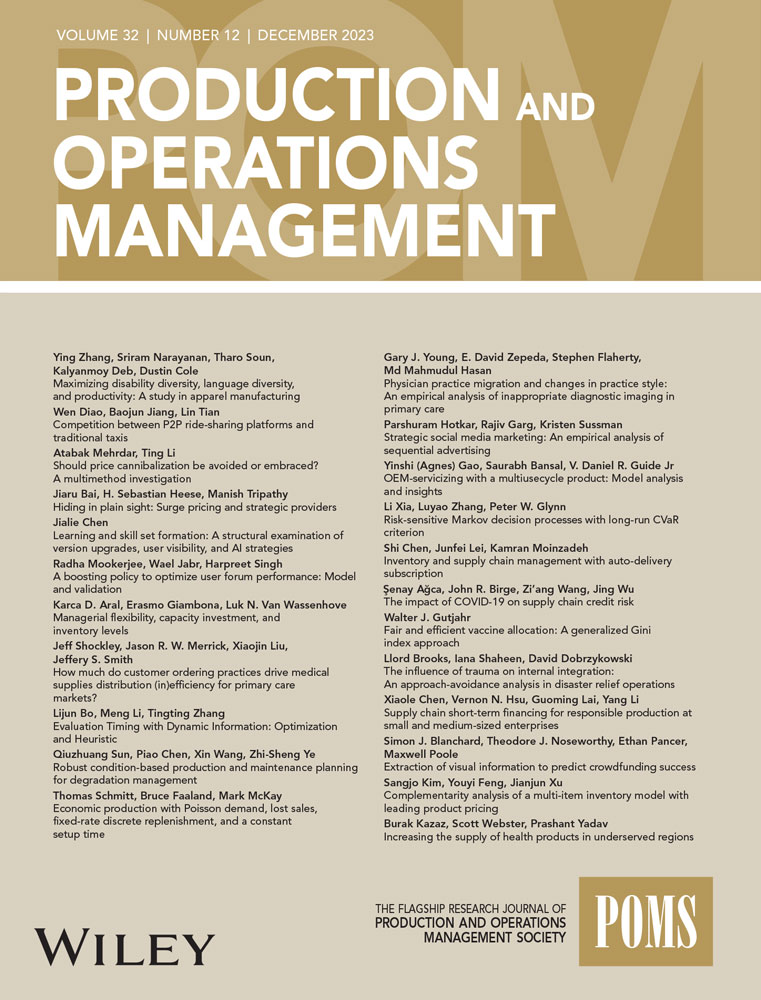通过公私合作确保集装箱供应链的安全
IF 5.1
3区 管理学
Q1 ENGINEERING, MANUFACTURING
引用次数: 0
摘要
全球贸易是海上贸易;90%的贸易货物是通过海运运输的,海运容易受到安全风险的影响。这导致各国政府启动了安全项目,服务于全球数以万计的成员。本文研究了政府的激励设计,以及海关检查能力与安全计划激励之间的相互作用。运用激励理论,探讨了合作伙伴关系在提高集装箱供应链安全性方面的价值。我们开发了一个以政府、公司和对手为主角的连续游戏。政府选择检查能力和激励措施来促进伙伴关系,即通过降低检查率获得的操作效益,以及通过降低对抗性渗透风险获得的安全效益。公司随后决定合作水平,随后战略对手决定渗透。利用对手的最佳对策,我们表明,在均衡状态下,政府对所有企业进行排名,并只与其中的一个子集进行合作。我们证明,在均衡的情况下,虽然安全激励可能使所有参与者受益,但应严格提供量身定制的业务激励,以促进合作。分析了构件实现免检测通道的条件。我们的研究结果也为实践提供了参考,以帮助安全政策制定者了解海关检查能力与激励设计之间的潜在相互作用,以促进与私营公司的合作。特别是,当选择合作的公司经历较低的检查率时,这进一步减少了整体拥堵,这反过来又为非成员公司创造了积极的外部性。因此,拥有多余的检查能力可能会导致更短的等待时间,这可能会阻止公司合作。本文章由计算机程序翻译,如有差异,请以英文原文为准。
Securing containerized supply chain through public and private partnership
Abstract Global trade is seafaring commerce; 90% of traded goods are carried by maritime transport, which has become vulnerable to security risks. This has led governments to initiate security programs serving tens of thousands of members worldwide. This paper studies the government's incentive design and the interaction between Customs inspection capacity and the incentives offered in security programs. Using the theory of incentives, we investigate the value of a partnership in improving the security of containerized supply chain. We developed a sequential game featuring the government, firms, and an adversary. The government selects the inspection capacity and incentives to foster the partnership, namely, an operational benefit in the form of a reduced inspection rate, and a security benefit obtained through reductions in the risks of adversarial infiltration. Firms subsequently decide on a collaboration level, followed by a strategic adversary's decision to infiltrate. Using the adversary's best response, we show that, in equilibrium, the government ranks all the firms and induces collaboration with only a subset of them. We demonstrate that, in equilibrium, while security incentives may benefit all participants, tailored operational incentives should be offered strictly to foster collaboration. The required condition to implement the inspection‐free lane for members is also characterized. Our results also inform practice to help security policymakers understand the underlying interaction between Customs inspection capacity and incentive design in forging collaboration with private firms. In particular, as firms opting for collaboration experience lower inspection rates, this further reduces overall congestion, which, in turn, creates a positive externality for nonmember firms. Therefore, having an excess inspection capacity may result in shorter wait times that could dissuade firms from collaborating.
求助全文
通过发布文献求助,成功后即可免费获取论文全文。
去求助
来源期刊

Production and Operations Management
管理科学-工程:制造
CiteScore
7.50
自引率
16.00%
发文量
278
审稿时长
24 months
期刊介绍:
The mission of Production and Operations Management is to serve as the flagship research journal in operations management in manufacturing and services. The journal publishes scientific research into the problems, interest, and concerns of managers who manage product and process design, operations, and supply chains. It covers all topics in product and process design, operations, and supply chain management and welcomes papers using any research paradigm.
 求助内容:
求助内容: 应助结果提醒方式:
应助结果提醒方式:


